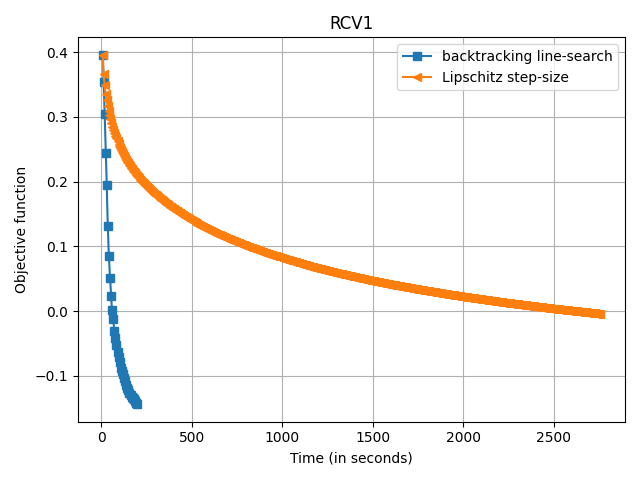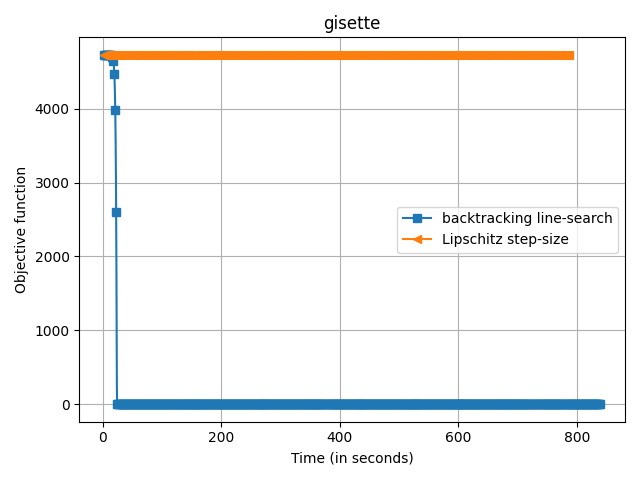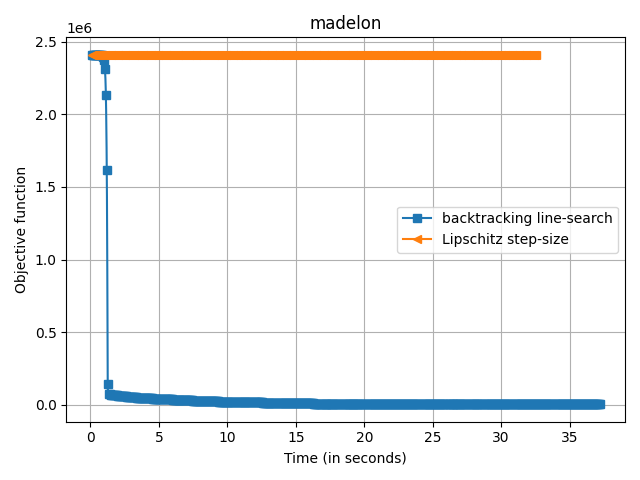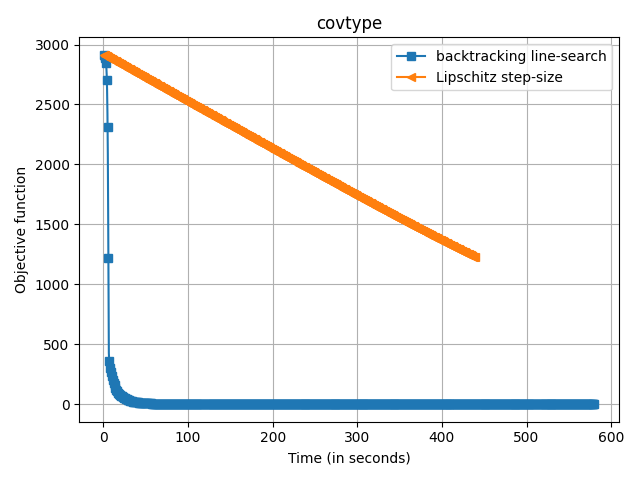Note
Click here to download the full example code
Benchmark of Pairwise Frank-Wolfe variants for sparse logistic regression¶
Speed of convergence of different Frank-Wolfe variants on various
problems with a logistic regression loss (copt.utils.LogLoss())
and a L1 ball constraint (copt.utils.L1Ball()).
Out:
Running on the RCV1 dataset
(697641, 47236)
Sparsity of solution: 0.0023499026166483193
0.30717282923725736
Running on the gisette dataset
(7000, 5000)
/workspace/copt/frank_wolfe.py:71: RuntimeWarning: divide by zero encountered in double_scalars
tmp = (certificate ** 2) / (2 * (old_f_t - f_t) * norm_update_direction)
Sparsity of solution: 0.0002
4734.010016774253
Running on the madelon dataset
(2600, 500)
Sparsity of solution: 0.004
2408517.4809582275
Running on the covtype dataset
(581012, 54)
Sparsity of solution: 0.037037037037037035
1225.9508846942538
import matplotlib.pyplot as plt
import numpy as np
import copt as cp
# .. datasets and their loading functions ..
# .. last value si the regularization parameter ..
# .. which has been chosen to give 10% feature sparsity ..
import copt.constraint
import copt.loss
datasets = (
{
"name": "RCV1",
"loader": cp.datasets.load_rcv1,
"alpha": 1e3,
"max_iter": 5000,
"f_star": 0.3114744279728717,
},
{
"name": "gisette",
"loader": cp.datasets.load_gisette,
"alpha": 1e4,
"max_iter": 5000,
"f_star": 2.293654421822428,
},
{
"name": "madelon",
"loader": cp.datasets.load_madelon,
"alpha": 1e4,
"max_iter": 5000,
"f_star": 0.0,
},
{
"name": "covtype",
"loader": cp.datasets.load_covtype,
"alpha": 1e4,
"max_iter": 5000,
"f_star": 0,
},
)
variants_fw = [
["backtracking", "backtracking line-search", "s"],
["DR", "Lipschitz step-size", "<"],
]
for d in datasets:
plt.figure()
print("Running on the %s dataset" % d["name"])
X, y = d["loader"]()
print(X.shape)
n_samples, n_features = X.shape
l1_ball = copt.constraint.L1Ball(d["alpha"])
f = copt.loss.LogLoss(X, y)
x0 = np.zeros(n_features)
x0[0] = d["alpha"] # start from a (random) vertex
for step, label, marker in variants_fw:
cb = cp.utils.Trace(f)
sol = cp.minimize_frank_wolfe(
f.f_grad,
x0,
l1_ball.lmo_pairwise,
callback=cb,
step=step,
lipschitz=f.lipschitz,
max_iter=d["max_iter"],
verbose=True,
tol=0,
)
plt.plot(
cb.trace_time,
np.array(cb.trace_fx) - d["f_star"],
label=label,
marker=marker,
markevery=10,
)
print("Sparsity of solution: %s" % np.mean(np.abs(sol.x) > 1e-8))
print(f(sol.x))
plt.legend()
plt.xlabel("Time (in seconds)")
plt.ylabel("Objective function")
plt.title(d["name"])
plt.tight_layout() # otherwise the right y-label is slightly clipped
# plt.xlim((0, 0.7 * cb.trace_time[-1])) # for aesthetics
plt.grid()
plt.show()
Total running time of the script: ( 94 minutes 37.843 seconds)
Estimated memory usage: 1519 MB





